Yi Jing Hexagram 60 - Line 1
The hexagram: 60
An hexagram is a combination of six yin and yang lines.

60.1 (60 > 29) - THE KIEH HEXAGRAM.
The first line, undivided, shows its subject not quitting the courtyard outside his door. There will be no error.
Bing DeepL Google Yandex60.1 (60 > 29) - Calming one' s joy
One stops tiring oneself while waiting for one's friends to return.
Bing DeepL Google Yandex60.1 (60 > 29) - Calming one' s joy
One stops tiring oneself while waiting for one's friends to return.
Bing DeepL Google Yandex60.1 (60 > 29) - Tsieh, la délimitation
Tsieh : règle, loi, mesure.
Tel ne sort pas de la porte extérieure de son habitation et n’en a point de regret.
(Dès qu’il voit tout ce qui se passe chez lui, il peut tout y bien gouverner.) Quand on sait qu’il y a lieu de ne pas sortir ou bien empêchement.
60.1 (60 > 29) - Calmer sa joie
On arrête de se fatiguer en attendant que ses amis reviennent.
Bing DeepL Google Yandex60.1 (60 > 29) - Korlátozás
Nem gyötri saját magát tovább miközben várja hogy visszatérjenek a barátai.
Bing DeepL Google YandexThe trigrams
The trigrams are combinations of three yin and yang lines. The three bottom lines of the hexagram form the lower trigram and represent the inner situation. The three top lines form the upper trigram and represent the outer situation.
trigSup

Lower trigram: The lake The water


The nuclear hexagram: 27
The nuclear hexagram is the association of the two inner trigrams (lines 2,3,4 and 3,4,5). It represents the root, or the origin of the situation.

27 - THE Î HEXAGRAM.
Î indicates that with firm correctness there will be good fortune (in what is denoted by it). We must look at what we are seeking to nourish, and by the exercise of our thoughts seek for the proper aliment.
Bing DeepL Google Yandex27 - I, l’alimentation
Ī : 1. Entretenir, soutenir ; 2. Menton, côté de la bouche ; 3. Profond.
Texte
Entretenir : achève heureusement. (Il faut) examiner soigneusement comment on entretient. On doit chercher soi-même ce qui est bon pour sa bouche.
Symbolisme
Une montagne au-dessus du tonnerre (image de celui qui réprime ses désirs, restreint ses tendances). Le sage s’observe ainsi en ses paroles et modère l’usage des aliments.
Commentaire
Entretenir sa rectitude est cause de bonheur. On doit examiner ce que l’on entretient et ce qui doit nous entretenir. Le ciel et la terre entretiennent tout ; le saint entretient la sagesse pour atteindre par eux tous les peuples. Grande est l’opportunité de l’entretien.
The derived (Fan Yao)
The same line number on the mutated hexagram. It reperesents what can be done AFTER to correct the situation described by this line, as a sort of remedy or solution.
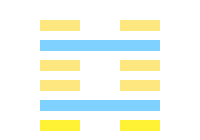
29.1 (29 > 60) - THE KHAN HEXAGRAM.
The first line, divided, shows its subject in the double defile, and (yet) entering a cavern within it. There will be evil.
Bing DeepL Google Yandex29.1 (29 > 60) - Dealing with problems in the right order
When one has encountered a difficulty, one must solve it before facing others.
Bing DeepL Google Yandex29.1 (29 > 60) - Dealing with problems in the right order
When one has encountered a difficulty, one must solve it before facing others.
Bing DeepL Google Yandex29.1 (29 > 60) - K’ân, l’abîme
K’ān : danger, précipice, caverne. — Tsa k’ān : courir de grands risques ; s’exposer au danger pour un autre.
Courir des dangers, comme entrer dans une caverne d’un défilé dangereux, est chose redoutable.
Bing DeepL Google Yandex29.1 (29 > 60) - Traiter les problèmes dans l'ordre
Quand on a rencontré une difficulté, on doit la résoudre avant d'en affronter d'autres.
Bing DeepL Google Yandex29.1 (29 > 60) - Mélység
Ha egy nehézséggel találkozott, meg kell oldania mielőtt elkezdene foglalkozni egy másikkal.
Bing DeepL Google YandexThe juncture: 29.6
The derived of the reciprocal. It represents what could have been done BEFORE to prevent the situation described by this line, as a sort of remedy or solution.
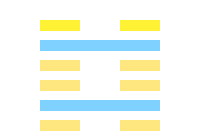
29.6 (29 > 59) - THE KHAN HEXAGRAM.
The topmost line, divided, shows its subject bound with cords of three strands or two strands, and placed in the thicket of thorns. But in three years he does not learn the course for him to pursue. There will be evil.
Bing DeepL Google Yandex29.6 (29 > 59) - Pausing
When it is too tiring, one can stop and resume later.
Bing DeepL Google Yandex29.6 (29 > 59) - Pausing
When it is too tiring, one can stop and resume later.
Bing DeepL Google Yandex29.6 (29 > 59) - K’ân, l’abîme
K’ān : danger, précipice, caverne. — Tsa k’ān : courir de grands risques ; s’exposer au danger pour un autre.
Danger de celui qui, lié, vinculé de triples liens, enfermé dans un cachot, ne peut de longtemps parvenir à se délivrer. Sort funeste ! — Tel est celui qui a perdu la voie de la sagesse
Bing DeepL Google Yandex29.6 (29 > 59) - Mettre en pause
Quand c'est trop fatiguant, on peut s'arrêter et reprendre plus tard.
Bing DeepL Google Yandex29.6 (29 > 59) - Mélység
Ha túl fáradt, meg kell állnia és később folytatnia.
Bing DeepL Google YandexThe reciprocal: 59.6
The hexagram upside down. It represents the opposite situation, and as such is insturmental when validating comments.

59.6 (59 > 29) - THE HWÂN HEXAGRAM.
The topmost line, undivided, shows its subject disposing of (what may be called) its bloody wounds, and going and separating himself from its anxious fears. There will be no error.
Bing DeepL Google Yandex59.6 (59 > 29) - Losing confidence
When one does not know if one can repair, one moves away and renounces to ask the most capable for the means to continue.
Bing DeepL Google Yandex59.6 (59 > 29) - Losing confidence
When one does not know if one can repair, one moves away and renounces to ask the most capable for the means to continue.
Bing DeepL Google Yandex59.6 (59 > 29) - Hwán, la dissolution
Hwán : extension, exposition, développement, abondance débordante ; dispersion, dissipation.
Répandre (hwán) son sang pour repousser des envahisseurs et se mettre en avant pour cela, sans regret. (C’est ce qu’il faut faire.)
Répandre son sang pour éloigner les malheurs.
59.6 (59 > 29) - Perdre son assurance
Quand on ne sait pas si on peut réparer, on s'éloigne et on renonce à demander aux plus capables des moyens pour continuer.
Bing DeepL Google Yandex59.6 (59 > 29) - Elválasztás
Ha valaki nem tudja hogyan javítsa meg, menjen és igényeiről lemondva kérje meg a legrátermettebbet a folytatásra.
Bing DeepL Google YandexMutations

60.1 (60 > 29) - THE KIEH HEXAGRAM.
The first line, undivided, shows its subject not quitting the courtyard outside his door. There will be no error.
Bing DeepL Google Yandex60.1 (60 > 29) - Calming one' s joy
One stops tiring oneself while waiting for one's friends to return.
Bing DeepL Google Yandex60.1 (60 > 29) - Calming one' s joy
One stops tiring oneself while waiting for one's friends to return.
Bing DeepL Google Yandex60.1 (60 > 29) - Tsieh, la délimitation
Tsieh : règle, loi, mesure.
Tel ne sort pas de la porte extérieure de son habitation et n’en a point de regret.
(Dès qu’il voit tout ce qui se passe chez lui, il peut tout y bien gouverner.) Quand on sait qu’il y a lieu de ne pas sortir ou bien empêchement.
60.1 (60 > 29) - Calmer sa joie
On arrête de se fatiguer en attendant que ses amis reviennent.
Bing DeepL Google Yandex60.1 (60 > 29) - Korlátozás
Nem gyötri saját magát tovább miközben várja hogy visszatérjenek a barátai.
Bing DeepL Google Yandex
60.1.2 (60 > 8) - THE KIEH HEXAGRAM.
- 1. The first line, undivided, shows its subject not quitting the courtyard outside his door. There will be no error.
- 2. The second line, undivided, shows its subject not quitting the courtyard inside his gate. There will be evil.
60.1.2 (60 > 8) - The limit
One refrains from doing better than the others.
Bing DeepL Google Yandex60.1.2 (60 > 8) - The limit
One refrains from doing better than the others.
Bing DeepL Google Yandex60.1.2 (60 > 8) - Tsieh, la délimitation
Tsieh : règle, loi, mesure.
-
1. Tel ne sort pas de la porte extérieure de son habitation et n’en a point de regret.
(Dès qu’il voit tout ce qui se passe chez lui, il peut tout y bien gouverner.) Quand on sait qu’il y a lieu de ne pas sortir ou bien empêchement. -
2. Mais s’il ne passe pas la porte intérieure de la maison (celle du quartier intérieur, du quartier des femmes), il éprouvera les mauvais effets de cette conduite. (Ne voyant que partiellement ce qui se passe chez lui, il pourra lui arriver des désagréments.)
Il manquera le point de temps extrême pour faire le nécessaire selon les circonstances.
60.1.2 (60 > 8) - Korlátozás
- 1. Nem gyötri saját magát tovább miközben várja hogy visszatérjenek a barátai.
- 2. Elrejti a bizonytalanságokat hogy uralja a helyzetet.

60.1.3 (60 > 48) - THE KIEH HEXAGRAM.
- 1. The first line, undivided, shows its subject not quitting the courtyard outside his door. There will be no error.
- 3. The third line, divided, shows its subject with no appearance of observing the (proper) regulations, in which case we shall see him lamenting. But there will be no one to blame (but himself).
60.1.3 (60 > 48) - Reviewing one's defensive strategy
One covers one's back so as not to be caught off guard.
Bing DeepL Google Yandex60.1.3 (60 > 48) - Reviewing one's defensive strategy
One covers one's back so as not to be caught off guard.
Bing DeepL Google Yandex60.1.3 (60 > 48) - Tsieh, la délimitation
Tsieh : règle, loi, mesure.
-
1. Tel ne sort pas de la porte extérieure de son habitation et n’en a point de regret.
(Dès qu’il voit tout ce qui se passe chez lui, il peut tout y bien gouverner.) Quand on sait qu’il y a lieu de ne pas sortir ou bien empêchement. - 3. Qui n’observe pas les lois s’en repentira suffisamment par la suite et se lamentera sans que personne ait besoin de le blâmer. (Ou bien : s’en repentira si amèrement que personne n’aura le courage de le blâmer.)
60.1.3 (60 > 48) - Revoir sa stratégie défensive
On couvre ses arrières pour ne pas être pris au dépourvu.
Bing DeepL Google Yandex60.1.3 (60 > 48) - Korlátozás
- 1. Nem gyötri saját magát tovább miközben várja hogy visszatérjenek a barátai.
- 3. Túl gyenge hogy táplálja a csoportját így felkészül hogy felszámolja a függőségüket.

60.1.2.3 (60 > 39) - THE KIEH HEXAGRAM.
- 1. The first line, undivided, shows its subject not quitting the courtyard outside his door. There will be no error.
- 2. The second line, undivided, shows its subject not quitting the courtyard inside his gate. There will be evil.
- 3. The third line, divided, shows its subject with no appearance of observing the (proper) regulations, in which case we shall see him lamenting. But there will be no one to blame (but himself).
60.1.2.3 (60 > 39) - The limit
The others want to do everything so one frees the space.
Bing DeepL Google Yandex60.1.2.3 (60 > 39) - The limit
The others want to do everything so one frees the space.
Bing DeepL Google Yandex60.1.2.3 (60 > 39) - Tsieh, la délimitation
Tsieh : règle, loi, mesure.
-
1. Tel ne sort pas de la porte extérieure de son habitation et n’en a point de regret.
(Dès qu’il voit tout ce qui se passe chez lui, il peut tout y bien gouverner.) Quand on sait qu’il y a lieu de ne pas sortir ou bien empêchement. -
2. Mais s’il ne passe pas la porte intérieure de la maison (celle du quartier intérieur, du quartier des femmes), il éprouvera les mauvais effets de cette conduite. (Ne voyant que partiellement ce qui se passe chez lui, il pourra lui arriver des désagréments.)
Il manquera le point de temps extrême pour faire le nécessaire selon les circonstances. - 3. Qui n’observe pas les lois s’en repentira suffisamment par la suite et se lamentera sans que personne ait besoin de le blâmer. (Ou bien : s’en repentira si amèrement que personne n’aura le courage de le blâmer.)
60.1.2.3 (60 > 39) - La limite
Les autres veulent tout faire alors on libère la place.
Bing DeepL Google Yandex60.1.2.3 (60 > 39) - Korlátozás
- 1. Nem gyötri saját magát tovább miközben várja hogy visszatérjenek a barátai.
- 2. Elrejti a bizonytalanságokat hogy uralja a helyzetet.
- 3. Túl gyenge hogy táplálja a csoportját így felkészül hogy felszámolja a függőségüket.

60.1.4 (60 > 47) - THE KIEH HEXAGRAM.
- 1. The first line, undivided, shows its subject not quitting the courtyard outside his door. There will be no error.
- 4. The fourth line, divided, shows its subject quietly and naturally (attentive to all) regulations. There will be progress and success.
60.1.4 (60 > 47) - The limit
One picks up the pace so as not to arrive late.
Bing DeepL Google Yandex60.1.4 (60 > 47) - The limit
One picks up the pace so as not to arrive late.
Bing DeepL Google Yandex60.1.4 (60 > 47) - Tsieh, la délimitation
Tsieh : règle, loi, mesure.
-
1. Tel ne sort pas de la porte extérieure de son habitation et n’en a point de regret.
(Dès qu’il voit tout ce qui se passe chez lui, il peut tout y bien gouverner.) Quand on sait qu’il y a lieu de ne pas sortir ou bien empêchement. - 4. Les lois observées pacifiquement donnent la prospérité [et perpétuent le règne de la justice.]
60.1.4 (60 > 47) - La limite
On presse le pas pour ne pas arriver en retard.
Bing DeepL Google Yandex60.1.4 (60 > 47) - Korlátozás
- 1. Nem gyötri saját magát tovább miközben várja hogy visszatérjenek a barátai.
- 4. Vonakodik hogy kérje másoktól hogy elfogadják a fáradtságot, így befejezi az előkészítést a legalkalmasabbal.

60.1.2.4 (60 > 45) - THE KIEH HEXAGRAM.
- 1. The first line, undivided, shows its subject not quitting the courtyard outside his door. There will be no error.
- 2. The second line, undivided, shows its subject not quitting the courtyard inside his gate. There will be evil.
- 4. The fourth line, divided, shows its subject quietly and naturally (attentive to all) regulations. There will be progress and success.
60.1.2.4 (60 > 45) - The limit
One organises the sale of illegal products to finance a righteous cause.
Bing DeepL Google Yandex60.1.2.4 (60 > 45) - The limit
One organizes the sale of illegal products to finance a righteous cause.
Bing DeepL Google Yandex60.1.2.4 (60 > 45) - Tsieh, la délimitation
Tsieh : règle, loi, mesure.
-
1. Tel ne sort pas de la porte extérieure de son habitation et n’en a point de regret.
(Dès qu’il voit tout ce qui se passe chez lui, il peut tout y bien gouverner.) Quand on sait qu’il y a lieu de ne pas sortir ou bien empêchement. -
2. Mais s’il ne passe pas la porte intérieure de la maison (celle du quartier intérieur, du quartier des femmes), il éprouvera les mauvais effets de cette conduite. (Ne voyant que partiellement ce qui se passe chez lui, il pourra lui arriver des désagréments.)
Il manquera le point de temps extrême pour faire le nécessaire selon les circonstances. - 4. Les lois observées pacifiquement donnent la prospérité [et perpétuent le règne de la justice.]
60.1.2.4 (60 > 45) - La limite
On organise la vente de produits illicites pour financer une cause juste.
Bing DeepL Google Yandex60.1.2.4 (60 > 45) - Korlátozás
- 1. Nem gyötri saját magát tovább miközben várja hogy visszatérjenek a barátai.
- 2. Elrejti a bizonytalanságokat hogy uralja a helyzetet.
- 4. Vonakodik hogy kérje másoktól hogy elfogadják a fáradtságot, így befejezi az előkészítést a legalkalmasabbal.

60.1.3.4 (60 > 28) - THE KIEH HEXAGRAM.
- 1. The first line, undivided, shows its subject not quitting the courtyard outside his door. There will be no error.
- 3. The third line, divided, shows its subject with no appearance of observing the (proper) regulations, in which case we shall see him lamenting. But there will be no one to blame (but himself).
- 4. The fourth line, divided, shows its subject quietly and naturally (attentive to all) regulations. There will be progress and success.
60.1.3.4 (60 > 28) - The limit
One is reluctant to do what the others ask for, even though one has agreed to it in principle.
Bing DeepL Google Yandex60.1.3.4 (60 > 28) - The limit
One is reluctant to do what the others ask for, even though one has agreed to it in principle.
Bing DeepL Google Yandex60.1.3.4 (60 > 28) - Tsieh, la délimitation
Tsieh : règle, loi, mesure.
-
1. Tel ne sort pas de la porte extérieure de son habitation et n’en a point de regret.
(Dès qu’il voit tout ce qui se passe chez lui, il peut tout y bien gouverner.) Quand on sait qu’il y a lieu de ne pas sortir ou bien empêchement. - 3. Qui n’observe pas les lois s’en repentira suffisamment par la suite et se lamentera sans que personne ait besoin de le blâmer. (Ou bien : s’en repentira si amèrement que personne n’aura le courage de le blâmer.)
- 4. Les lois observées pacifiquement donnent la prospérité [et perpétuent le règne de la justice.]
60.1.3.4 (60 > 28) - La limite
On répugne à faire ce que les autres demandent bien qu'on en ait accepté le principe.
Bing DeepL Google Yandex60.1.3.4 (60 > 28) - Korlátozás
- 1. Nem gyötri saját magát tovább miközben várja hogy visszatérjenek a barátai.
- 3. Túl gyenge hogy táplálja a csoportját így felkészül hogy felszámolja a függőségüket.
- 4. Vonakodik hogy kérje másoktól hogy elfogadják a fáradtságot, így befejezi az előkészítést a legalkalmasabbal.

60.1.2.3.4 (60 > 31) - THE KIEH HEXAGRAM.
- 1. The first line, undivided, shows its subject not quitting the courtyard outside his door. There will be no error.
- 2. The second line, undivided, shows its subject not quitting the courtyard inside his gate. There will be evil.
- 3. The third line, divided, shows its subject with no appearance of observing the (proper) regulations, in which case we shall see him lamenting. But there will be no one to blame (but himself).
- 4. The fourth line, divided, shows its subject quietly and naturally (attentive to all) regulations. There will be progress and success.
60.1.2.3.4 (60 > 31) - The limit
One understands the advantage of not following the rules, but fears that breaking them would lead to fatal consequences.
Bing DeepL Google Yandex60.1.2.3.4 (60 > 31) - The limit
One understands the advantage of not following the rules, but fears that breaking them would lead to fatal consequences.
Bing DeepL Google Yandex60.1.2.3.4 (60 > 31) - Tsieh, la délimitation
Tsieh : règle, loi, mesure.
-
1. Tel ne sort pas de la porte extérieure de son habitation et n’en a point de regret.
(Dès qu’il voit tout ce qui se passe chez lui, il peut tout y bien gouverner.) Quand on sait qu’il y a lieu de ne pas sortir ou bien empêchement. -
2. Mais s’il ne passe pas la porte intérieure de la maison (celle du quartier intérieur, du quartier des femmes), il éprouvera les mauvais effets de cette conduite. (Ne voyant que partiellement ce qui se passe chez lui, il pourra lui arriver des désagréments.)
Il manquera le point de temps extrême pour faire le nécessaire selon les circonstances. - 3. Qui n’observe pas les lois s’en repentira suffisamment par la suite et se lamentera sans que personne ait besoin de le blâmer. (Ou bien : s’en repentira si amèrement que personne n’aura le courage de le blâmer.)
- 4. Les lois observées pacifiquement donnent la prospérité [et perpétuent le règne de la justice.]
60.1.2.3.4 (60 > 31) - La limite
On comprend l'avantage que l'on obtiendrait en ne suivant pas les règles mais on redoute que les enfreindre entraîne des conséquences funestes.
Bing DeepL Google Yandex60.1.2.3.4 (60 > 31) - Korlátozás
- 1. Nem gyötri saját magát tovább miközben várja hogy visszatérjenek a barátai.
- 2. Elrejti a bizonytalanságokat hogy uralja a helyzetet.
- 3. Túl gyenge hogy táplálja a csoportját így felkészül hogy felszámolja a függőségüket.
- 4. Vonakodik hogy kérje másoktól hogy elfogadják a fáradtságot, így befejezi az előkészítést a legalkalmasabbal.
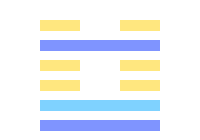
60.1.5 (60 > 7) - THE KIEH HEXAGRAM.
- 1. The first line, undivided, shows its subject not quitting the courtyard outside his door. There will be no error.
- 5. The fifth line, undivided, shows its subject sweetly and acceptably enacting his regulations. There will be good fortune. The onward progress with them will afford ground for admiration.
60.1.5 (60 > 7) - The limit
One mentions facts that one will regret having talked about.
Bing DeepL Google Yandex60.1.5 (60 > 7) - The limit
One mentions facts that one will regret having talked about.
Bing DeepL Google Yandex60.1.5 (60 > 7) - Tsieh, la délimitation
Tsieh : règle, loi, mesure.
-
1. Tel ne sort pas de la porte extérieure de son habitation et n’en a point de regret.
(Dès qu’il voit tout ce qui se passe chez lui, il peut tout y bien gouverner.) Quand on sait qu’il y a lieu de ne pas sortir ou bien empêchement. - 5. Appliquer doucement les lois est une condition de prospérité. En procédant ainsi, on se rendra illustre ; [car on remplit alors ses fonctions parfaitement.]
60.1.5 (60 > 7) - La limite
On évoque des faits dont on regrettera avoir parlé.
Bing DeepL Google Yandex60.1.5 (60 > 7) - Korlátozás
- 1. Nem gyötri saját magát tovább miközben várja hogy visszatérjenek a barátai.
- 5. Segítség nélkül felfedez egy új utat hogy megoldja a szükségest, így elismerést kap.
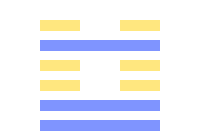
60.1.2.5 (60 > 2) - THE KIEH HEXAGRAM.
- 1. The first line, undivided, shows its subject not quitting the courtyard outside his door. There will be no error.
- 2. The second line, undivided, shows its subject not quitting the courtyard inside his gate. There will be evil.
- 5. The fifth line, undivided, shows its subject sweetly and acceptably enacting his regulations. There will be good fortune. The onward progress with them will afford ground for admiration.
60.1.2.5 (60 > 2) - The limit
One knows the exact moment when it will be necessary to act.
Bing DeepL Google Yandex60.1.2.5 (60 > 2) - The limit
One knows the exact moment when it will be necessary to act.
Bing DeepL Google Yandex60.1.2.5 (60 > 2) - Tsieh, la délimitation
Tsieh : règle, loi, mesure.
-
1. Tel ne sort pas de la porte extérieure de son habitation et n’en a point de regret.
(Dès qu’il voit tout ce qui se passe chez lui, il peut tout y bien gouverner.) Quand on sait qu’il y a lieu de ne pas sortir ou bien empêchement. -
2. Mais s’il ne passe pas la porte intérieure de la maison (celle du quartier intérieur, du quartier des femmes), il éprouvera les mauvais effets de cette conduite. (Ne voyant que partiellement ce qui se passe chez lui, il pourra lui arriver des désagréments.)
Il manquera le point de temps extrême pour faire le nécessaire selon les circonstances. - 5. Appliquer doucement les lois est une condition de prospérité. En procédant ainsi, on se rendra illustre ; [car on remplit alors ses fonctions parfaitement.]
60.1.2.5 (60 > 2) - La limite
On connaît le moment précis où il faudra agir.
Bing DeepL Google Yandex60.1.2.5 (60 > 2) - Korlátozás
- 1. Nem gyötri saját magát tovább miközben várja hogy visszatérjenek a barátai.
- 2. Elrejti a bizonytalanságokat hogy uralja a helyzetet.
- 5. Segítség nélkül felfedez egy új utat hogy megoldja a szükségest, így elismerést kap.
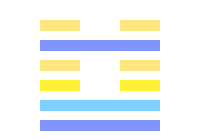
60.1.3.5 (60 > 46) - THE KIEH HEXAGRAM.
- 1. The first line, undivided, shows its subject not quitting the courtyard outside his door. There will be no error.
- 3. The third line, divided, shows its subject with no appearance of observing the (proper) regulations, in which case we shall see him lamenting. But there will be no one to blame (but himself).
- 5. The fifth line, undivided, shows its subject sweetly and acceptably enacting his regulations. There will be good fortune. The onward progress with them will afford ground for admiration.
60.1.3.5 (60 > 46) - Thinking oneself superior to others
One patronises modest people.
Bing DeepL Google Yandex60.1.3.5 (60 > 46) - Thinking oneself superior to others
One patronizes modest people.
Bing DeepL Google Yandex60.1.3.5 (60 > 46) - Tsieh, la délimitation
Tsieh : règle, loi, mesure.
-
1. Tel ne sort pas de la porte extérieure de son habitation et n’en a point de regret.
(Dès qu’il voit tout ce qui se passe chez lui, il peut tout y bien gouverner.) Quand on sait qu’il y a lieu de ne pas sortir ou bien empêchement. - 3. Qui n’observe pas les lois s’en repentira suffisamment par la suite et se lamentera sans que personne ait besoin de le blâmer. (Ou bien : s’en repentira si amèrement que personne n’aura le courage de le blâmer.)
- 5. Appliquer doucement les lois est une condition de prospérité. En procédant ainsi, on se rendra illustre ; [car on remplit alors ses fonctions parfaitement.]
60.1.3.5 (60 > 46) - Se croire supérieur aux autres
On traite avec condescendance des personnes modestes.
Bing DeepL Google Yandex60.1.3.5 (60 > 46) - Korlátozás
- 1. Nem gyötri saját magát tovább miközben várja hogy visszatérjenek a barátai.
- 3. Túl gyenge hogy táplálja a csoportját így felkészül hogy felszámolja a függőségüket.
- 5. Segítség nélkül felfedez egy új utat hogy megoldja a szükségest, így elismerést kap.
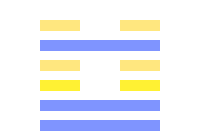
60.1.2.3.5 (60 > 15) - THE KIEH HEXAGRAM.
- 1. The first line, undivided, shows its subject not quitting the courtyard outside his door. There will be no error.
- 2. The second line, undivided, shows its subject not quitting the courtyard inside his gate. There will be evil.
- 3. The third line, divided, shows its subject with no appearance of observing the (proper) regulations, in which case we shall see him lamenting. But there will be no one to blame (but himself).
- 5. The fifth line, undivided, shows its subject sweetly and acceptably enacting his regulations. There will be good fortune. The onward progress with them will afford ground for admiration.
60.1.2.3.5 (60 > 15) - The limit
One supplies one's relatives despite the shortage.
Bing DeepL Google Yandex60.1.2.3.5 (60 > 15) - The limit
One supplies one's relatives despite the shortage.
Bing DeepL Google Yandex60.1.2.3.5 (60 > 15) - Tsieh, la délimitation
Tsieh : règle, loi, mesure.
-
1. Tel ne sort pas de la porte extérieure de son habitation et n’en a point de regret.
(Dès qu’il voit tout ce qui se passe chez lui, il peut tout y bien gouverner.) Quand on sait qu’il y a lieu de ne pas sortir ou bien empêchement. -
2. Mais s’il ne passe pas la porte intérieure de la maison (celle du quartier intérieur, du quartier des femmes), il éprouvera les mauvais effets de cette conduite. (Ne voyant que partiellement ce qui se passe chez lui, il pourra lui arriver des désagréments.)
Il manquera le point de temps extrême pour faire le nécessaire selon les circonstances. - 3. Qui n’observe pas les lois s’en repentira suffisamment par la suite et se lamentera sans que personne ait besoin de le blâmer. (Ou bien : s’en repentira si amèrement que personne n’aura le courage de le blâmer.)
- 5. Appliquer doucement les lois est une condition de prospérité. En procédant ainsi, on se rendra illustre ; [car on remplit alors ses fonctions parfaitement.]
60.1.2.3.5 (60 > 15) - La limite
On ravitaille ses proches malgré la pénurie.
Bing DeepL Google Yandex60.1.2.3.5 (60 > 15) - Korlátozás
- 1. Nem gyötri saját magát tovább miközben várja hogy visszatérjenek a barátai.
- 2. Elrejti a bizonytalanságokat hogy uralja a helyzetet.
- 3. Túl gyenge hogy táplálja a csoportját így felkészül hogy felszámolja a függőségüket.
- 5. Segítség nélkül felfedez egy új utat hogy megoldja a szükségest, így elismerést kap.
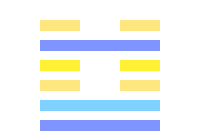
60.1.4.5 (60 > 40) - THE KIEH HEXAGRAM.
- 1. The first line, undivided, shows its subject not quitting the courtyard outside his door. There will be no error.
- 4. The fourth line, divided, shows its subject quietly and naturally (attentive to all) regulations. There will be progress and success.
- 5. The fifth line, undivided, shows its subject sweetly and acceptably enacting his regulations. There will be good fortune. The onward progress with them will afford ground for admiration.
60.1.4.5 (60 > 40) - The limit
One receives even more benefits than others when one is ready to satisfy all the demands.
Bing DeepL Google Yandex60.1.4.5 (60 > 40) - The limit
One receives even more benefits than others when one is ready to satisfy all the demands.
Bing DeepL Google Yandex60.1.4.5 (60 > 40) - Tsieh, la délimitation
Tsieh : règle, loi, mesure.
-
1. Tel ne sort pas de la porte extérieure de son habitation et n’en a point de regret.
(Dès qu’il voit tout ce qui se passe chez lui, il peut tout y bien gouverner.) Quand on sait qu’il y a lieu de ne pas sortir ou bien empêchement. - 4. Les lois observées pacifiquement donnent la prospérité [et perpétuent le règne de la justice.]
- 5. Appliquer doucement les lois est une condition de prospérité. En procédant ainsi, on se rendra illustre ; [car on remplit alors ses fonctions parfaitement.]
60.1.4.5 (60 > 40) - La limite
On reçoit encore plus de bienfaits que les autres quand on est prêt à satisfaire toutes les demandes.
Bing DeepL Google Yandex60.1.4.5 (60 > 40) - Korlátozás
- 1. Nem gyötri saját magát tovább miközben várja hogy visszatérjenek a barátai.
- 4. Vonakodik hogy kérje másoktól hogy elfogadják a fáradtságot, így befejezi az előkészítést a legalkalmasabbal.
- 5. Segítség nélkül felfedez egy új utat hogy megoldja a szükségest, így elismerést kap.
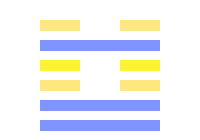
60.1.2.4.5 (60 > 16) - THE KIEH HEXAGRAM.
- 1. The first line, undivided, shows its subject not quitting the courtyard outside his door. There will be no error.
- 2. The second line, undivided, shows its subject not quitting the courtyard inside his gate. There will be evil.
- 4. The fourth line, divided, shows its subject quietly and naturally (attentive to all) regulations. There will be progress and success.
- 5. The fifth line, undivided, shows its subject sweetly and acceptably enacting his regulations. There will be good fortune. The onward progress with them will afford ground for admiration.
60.1.2.4.5 (60 > 16) - The limit
One apologises for the little skill that one has deployed.
Bing DeepL Google Yandex60.1.2.4.5 (60 > 16) - The limit
One apologizes for the little skill that one has deployed.
Bing DeepL Google Yandex60.1.2.4.5 (60 > 16) - Tsieh, la délimitation
Tsieh : règle, loi, mesure.
-
1. Tel ne sort pas de la porte extérieure de son habitation et n’en a point de regret.
(Dès qu’il voit tout ce qui se passe chez lui, il peut tout y bien gouverner.) Quand on sait qu’il y a lieu de ne pas sortir ou bien empêchement. -
2. Mais s’il ne passe pas la porte intérieure de la maison (celle du quartier intérieur, du quartier des femmes), il éprouvera les mauvais effets de cette conduite. (Ne voyant que partiellement ce qui se passe chez lui, il pourra lui arriver des désagréments.)
Il manquera le point de temps extrême pour faire le nécessaire selon les circonstances. - 4. Les lois observées pacifiquement donnent la prospérité [et perpétuent le règne de la justice.]
- 5. Appliquer doucement les lois est une condition de prospérité. En procédant ainsi, on se rendra illustre ; [car on remplit alors ses fonctions parfaitement.]
60.1.2.4.5 (60 > 16) - La limite
On s'excuse du peu de talent que l'on a déployé.
Bing DeepL Google Yandex60.1.2.4.5 (60 > 16) - Korlátozás
- 1. Nem gyötri saját magát tovább miközben várja hogy visszatérjenek a barátai.
- 2. Elrejti a bizonytalanságokat hogy uralja a helyzetet.
- 4. Vonakodik hogy kérje másoktól hogy elfogadják a fáradtságot, így befejezi az előkészítést a legalkalmasabbal.
- 5. Segítség nélkül felfedez egy új utat hogy megoldja a szükségest, így elismerést kap.
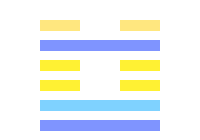
60.1.3.4.5 (60 > 32) - THE KIEH HEXAGRAM.
- 1. The first line, undivided, shows its subject not quitting the courtyard outside his door. There will be no error.
- 3. The third line, divided, shows its subject with no appearance of observing the (proper) regulations, in which case we shall see him lamenting. But there will be no one to blame (but himself).
- 4. The fourth line, divided, shows its subject quietly and naturally (attentive to all) regulations. There will be progress and success.
- 5. The fifth line, undivided, shows its subject sweetly and acceptably enacting his regulations. There will be good fortune. The onward progress with them will afford ground for admiration.
60.1.3.4.5 (60 > 32) - The limit
One starves to death when the others take everything.
Bing DeepL Google Yandex60.1.3.4.5 (60 > 32) - The limit
One starves to death when the others take everything.
Bing DeepL Google Yandex60.1.3.4.5 (60 > 32) - Tsieh, la délimitation
Tsieh : règle, loi, mesure.
-
1. Tel ne sort pas de la porte extérieure de son habitation et n’en a point de regret.
(Dès qu’il voit tout ce qui se passe chez lui, il peut tout y bien gouverner.) Quand on sait qu’il y a lieu de ne pas sortir ou bien empêchement. - 3. Qui n’observe pas les lois s’en repentira suffisamment par la suite et se lamentera sans que personne ait besoin de le blâmer. (Ou bien : s’en repentira si amèrement que personne n’aura le courage de le blâmer.)
- 4. Les lois observées pacifiquement donnent la prospérité [et perpétuent le règne de la justice.]
- 5. Appliquer doucement les lois est une condition de prospérité. En procédant ainsi, on se rendra illustre ; [car on remplit alors ses fonctions parfaitement.]
60.1.3.4.5 (60 > 32) - La limite
On crève de faim quand les autres prennent tout.
Bing DeepL Google Yandex60.1.3.4.5 (60 > 32) - Korlátozás
- 1. Nem gyötri saját magát tovább miközben várja hogy visszatérjenek a barátai.
- 3. Túl gyenge hogy táplálja a csoportját így felkészül hogy felszámolja a függőségüket.
- 4. Vonakodik hogy kérje másoktól hogy elfogadják a fáradtságot, így befejezi az előkészítést a legalkalmasabbal.
- 5. Segítség nélkül felfedez egy új utat hogy megoldja a szükségest, így elismerést kap.
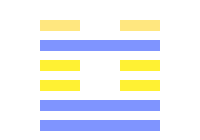
60.1.2.3.4.5 (60 > 62) - THE KIEH HEXAGRAM.
- 1. The first line, undivided, shows its subject not quitting the courtyard outside his door. There will be no error.
- 2. The second line, undivided, shows its subject not quitting the courtyard inside his gate. There will be evil.
- 3. The third line, divided, shows its subject with no appearance of observing the (proper) regulations, in which case we shall see him lamenting. But there will be no one to blame (but himself).
- 4. The fourth line, divided, shows its subject quietly and naturally (attentive to all) regulations. There will be progress and success.
- 5. The fifth line, undivided, shows its subject sweetly and acceptably enacting his regulations. There will be good fortune. The onward progress with them will afford ground for admiration.
60.1.2.3.4.5 (60 > 62) - The limit
One does way more than the others want because one is afraid that they have underestimated the difficulties.
Bing DeepL Google Yandex60.1.2.3.4.5 (60 > 62) - The limit
One does way more than the others want because one is afraid that they have underestimated the difficulties.
Bing DeepL Google Yandex60.1.2.3.4.5 (60 > 62) - Tsieh, la délimitation
Tsieh : règle, loi, mesure.
-
1. Tel ne sort pas de la porte extérieure de son habitation et n’en a point de regret.
(Dès qu’il voit tout ce qui se passe chez lui, il peut tout y bien gouverner.) Quand on sait qu’il y a lieu de ne pas sortir ou bien empêchement. -
2. Mais s’il ne passe pas la porte intérieure de la maison (celle du quartier intérieur, du quartier des femmes), il éprouvera les mauvais effets de cette conduite. (Ne voyant que partiellement ce qui se passe chez lui, il pourra lui arriver des désagréments.)
Il manquera le point de temps extrême pour faire le nécessaire selon les circonstances. - 3. Qui n’observe pas les lois s’en repentira suffisamment par la suite et se lamentera sans que personne ait besoin de le blâmer. (Ou bien : s’en repentira si amèrement que personne n’aura le courage de le blâmer.)
- 4. Les lois observées pacifiquement donnent la prospérité [et perpétuent le règne de la justice.]
- 5. Appliquer doucement les lois est une condition de prospérité. En procédant ainsi, on se rendra illustre ; [car on remplit alors ses fonctions parfaitement.]
60.1.2.3.4.5 (60 > 62) - La limite
On fait bien plus que ce que les autres veulent car on a peur qu'ils aient sous-estimé les difficultés.
Bing DeepL Google Yandex60.1.2.3.4.5 (60 > 62) - Korlátozás
- 1. Nem gyötri saját magát tovább miközben várja hogy visszatérjenek a barátai.
- 2. Elrejti a bizonytalanságokat hogy uralja a helyzetet.
- 3. Túl gyenge hogy táplálja a csoportját így felkészül hogy felszámolja a függőségüket.
- 4. Vonakodik hogy kérje másoktól hogy elfogadják a fáradtságot, így befejezi az előkészítést a legalkalmasabbal.
- 5. Segítség nélkül felfedez egy új utat hogy megoldja a szükségest, így elismerést kap.

60.1.6 (60 > 59) - THE KIEH HEXAGRAM.
- 1. The first line, undivided, shows its subject not quitting the courtyard outside his door. There will be no error.
- 6. The topmost line, divided, shows its subject enacting regulations severe and difficult. Even with firmness and correctness there will be evil. But though there will be cause for repentance, it will (by and by) disappear.
60.1.6 (60 > 59) - Losing allies for futile reasons
One is ridiculed by those who could have defended what one had imagined.
Bing DeepL Google Yandex60.1.6 (60 > 59) - Losing allies for futile reasons
One is ridiculed by those who could have defended what one had imagined.
Bing DeepL Google Yandex60.1.6 (60 > 59) - Tsieh, la délimitation
Tsieh : règle, loi, mesure.
-
1. Tel ne sort pas de la porte extérieure de son habitation et n’en a point de regret.
(Dès qu’il voit tout ce qui se passe chez lui, il peut tout y bien gouverner.) Quand on sait qu’il y a lieu de ne pas sortir ou bien empêchement. - 6. Les lois dures ont des conséquences très fâcheuses pour la prospérité. Le repentir (causé par leur violation) s’effacera. [Leur force et valeur s’épuiseront.] (Quand le peuple sent que les lois sont cruelles, il les viole sans scrupule ni repentir.)
60.1.6 (60 > 59) - Perdre ses alliés pour des motifs futiles
On est ridiculisé par ceux qui auraient pu défendre ce qu'on avait imaginé.
Bing DeepL Google Yandex60.1.6 (60 > 59) - Korlátozás
- 1. Nem gyötri saját magát tovább miközben várja hogy visszatérjenek a barátai.
- 6. Nagy nyomás alatt.

60.1.2.6 (60 > 20) - THE KIEH HEXAGRAM.
- 1. The first line, undivided, shows its subject not quitting the courtyard outside his door. There will be no error.
- 2. The second line, undivided, shows its subject not quitting the courtyard inside his gate. There will be evil.
- 6. The topmost line, divided, shows its subject enacting regulations severe and difficult. Even with firmness and correctness there will be evil. But though there will be cause for repentance, it will (by and by) disappear.
60.1.2.6 (60 > 20) - The limit
One starts again from scratch to rediscover the taste of the first emotions.
Bing DeepL Google Yandex60.1.2.6 (60 > 20) - The limit
One starts again from scratch to rediscover the taste of the first emotions.
Bing DeepL Google Yandex60.1.2.6 (60 > 20) - Tsieh, la délimitation
Tsieh : règle, loi, mesure.
-
1. Tel ne sort pas de la porte extérieure de son habitation et n’en a point de regret.
(Dès qu’il voit tout ce qui se passe chez lui, il peut tout y bien gouverner.) Quand on sait qu’il y a lieu de ne pas sortir ou bien empêchement. -
2. Mais s’il ne passe pas la porte intérieure de la maison (celle du quartier intérieur, du quartier des femmes), il éprouvera les mauvais effets de cette conduite. (Ne voyant que partiellement ce qui se passe chez lui, il pourra lui arriver des désagréments.)
Il manquera le point de temps extrême pour faire le nécessaire selon les circonstances. - 6. Les lois dures ont des conséquences très fâcheuses pour la prospérité. Le repentir (causé par leur violation) s’effacera. [Leur force et valeur s’épuiseront.] (Quand le peuple sent que les lois sont cruelles, il les viole sans scrupule ni repentir.)
60.1.2.6 (60 > 20) - La limite
On repart à zéro pour retrouver le goût des premiers émois.
Bing DeepL Google Yandex60.1.2.6 (60 > 20) - Korlátozás
- 1. Nem gyötri saját magát tovább miközben várja hogy visszatérjenek a barátai.
- 2. Elrejti a bizonytalanságokat hogy uralja a helyzetet.
- 6. Nagy nyomás alatt.

60.1.3.6 (60 > 57) - THE KIEH HEXAGRAM.
- 1. The first line, undivided, shows its subject not quitting the courtyard outside his door. There will be no error.
- 3. The third line, divided, shows its subject with no appearance of observing the (proper) regulations, in which case we shall see him lamenting. But there will be no one to blame (but himself).
- 6. The topmost line, divided, shows its subject enacting regulations severe and difficult. Even with firmness and correctness there will be evil. But though there will be cause for repentance, it will (by and by) disappear.
60.1.3.6 (60 > 57) - The limit
One contacts a relative to request that they provide assistance.
Bing DeepL Google Yandex60.1.3.6 (60 > 57) - The limit
One contacts a relative to request that they provide assistance.
Bing DeepL Google Yandex60.1.3.6 (60 > 57) - Tsieh, la délimitation
Tsieh : règle, loi, mesure.
-
1. Tel ne sort pas de la porte extérieure de son habitation et n’en a point de regret.
(Dès qu’il voit tout ce qui se passe chez lui, il peut tout y bien gouverner.) Quand on sait qu’il y a lieu de ne pas sortir ou bien empêchement. - 3. Qui n’observe pas les lois s’en repentira suffisamment par la suite et se lamentera sans que personne ait besoin de le blâmer. (Ou bien : s’en repentira si amèrement que personne n’aura le courage de le blâmer.)
- 6. Les lois dures ont des conséquences très fâcheuses pour la prospérité. Le repentir (causé par leur violation) s’effacera. [Leur force et valeur s’épuiseront.] (Quand le peuple sent que les lois sont cruelles, il les viole sans scrupule ni repentir.)
60.1.3.6 (60 > 57) - La limite
On contacte un proche pour lui demander d'envoyer des secours.
Bing DeepL Google Yandex60.1.3.6 (60 > 57) - Korlátozás
- 1. Nem gyötri saját magát tovább miközben várja hogy visszatérjenek a barátai.
- 3. Túl gyenge hogy táplálja a csoportját így felkészül hogy felszámolja a függőségüket.
- 6. Nagy nyomás alatt.

60.1.2.3.6 (60 > 53) - THE KIEH HEXAGRAM.
- 1. The first line, undivided, shows its subject not quitting the courtyard outside his door. There will be no error.
- 2. The second line, undivided, shows its subject not quitting the courtyard inside his gate. There will be evil.
- 3. The third line, divided, shows its subject with no appearance of observing the (proper) regulations, in which case we shall see him lamenting. But there will be no one to blame (but himself).
- 6. The topmost line, divided, shows its subject enacting regulations severe and difficult. Even with firmness and correctness there will be evil. But though there will be cause for repentance, it will (by and by) disappear.
60.1.2.3.6 (60 > 53) - The limit
One takes the place of one's protector but one is ready to give it back when asked for it.
Bing DeepL Google Yandex60.1.2.3.6 (60 > 53) - The limit
One takes the place of one's protector but one is ready to give it back when asked for it.
Bing DeepL Google Yandex60.1.2.3.6 (60 > 53) - Tsieh, la délimitation
Tsieh : règle, loi, mesure.
-
1. Tel ne sort pas de la porte extérieure de son habitation et n’en a point de regret.
(Dès qu’il voit tout ce qui se passe chez lui, il peut tout y bien gouverner.) Quand on sait qu’il y a lieu de ne pas sortir ou bien empêchement. -
2. Mais s’il ne passe pas la porte intérieure de la maison (celle du quartier intérieur, du quartier des femmes), il éprouvera les mauvais effets de cette conduite. (Ne voyant que partiellement ce qui se passe chez lui, il pourra lui arriver des désagréments.)
Il manquera le point de temps extrême pour faire le nécessaire selon les circonstances. - 3. Qui n’observe pas les lois s’en repentira suffisamment par la suite et se lamentera sans que personne ait besoin de le blâmer. (Ou bien : s’en repentira si amèrement que personne n’aura le courage de le blâmer.)
- 6. Les lois dures ont des conséquences très fâcheuses pour la prospérité. Le repentir (causé par leur violation) s’effacera. [Leur force et valeur s’épuiseront.] (Quand le peuple sent que les lois sont cruelles, il les viole sans scrupule ni repentir.)
60.1.2.3.6 (60 > 53) - La limite
On prend la place de son protecteur mais on est prêt à lui rendre quand il la demandera.
Bing DeepL Google Yandex60.1.2.3.6 (60 > 53) - Korlátozás
- 1. Nem gyötri saját magát tovább miközben várja hogy visszatérjenek a barátai.
- 2. Elrejti a bizonytalanságokat hogy uralja a helyzetet.
- 3. Túl gyenge hogy táplálja a csoportját így felkészül hogy felszámolja a függőségüket.
- 6. Nagy nyomás alatt.

60.1.4.6 (60 > 6) - THE KIEH HEXAGRAM.
- 1. The first line, undivided, shows its subject not quitting the courtyard outside his door. There will be no error.
- 4. The fourth line, divided, shows its subject quietly and naturally (attentive to all) regulations. There will be progress and success.
- 6. The topmost line, divided, shows its subject enacting regulations severe and difficult. Even with firmness and correctness there will be evil. But though there will be cause for repentance, it will (by and by) disappear.
60.1.4.6 (60 > 6) - Tsieh, la délimitation
Tsieh : règle, loi, mesure.
-
1. Tel ne sort pas de la porte extérieure de son habitation et n’en a point de regret.
(Dès qu’il voit tout ce qui se passe chez lui, il peut tout y bien gouverner.) Quand on sait qu’il y a lieu de ne pas sortir ou bien empêchement. - 4. Les lois observées pacifiquement donnent la prospérité [et perpétuent le règne de la justice.]
- 6. Les lois dures ont des conséquences très fâcheuses pour la prospérité. Le repentir (causé par leur violation) s’effacera. [Leur force et valeur s’épuiseront.] (Quand le peuple sent que les lois sont cruelles, il les viole sans scrupule ni repentir.)
60.1.4.6 (60 > 6) - Korlátozás
- 1. Nem gyötri saját magát tovább miközben várja hogy visszatérjenek a barátai.
- 4. Vonakodik hogy kérje másoktól hogy elfogadják a fáradtságot, így befejezi az előkészítést a legalkalmasabbal.
- 6. Nagy nyomás alatt.

60.1.2.4.6 (60 > 12) - THE KIEH HEXAGRAM.
- 1. The first line, undivided, shows its subject not quitting the courtyard outside his door. There will be no error.
- 2. The second line, undivided, shows its subject not quitting the courtyard inside his gate. There will be evil.
- 4. The fourth line, divided, shows its subject quietly and naturally (attentive to all) regulations. There will be progress and success.
- 6. The topmost line, divided, shows its subject enacting regulations severe and difficult. Even with firmness and correctness there will be evil. But though there will be cause for repentance, it will (by and by) disappear.
60.1.2.4.6 (60 > 12) - The limit
One refuses to believe a word of what others say.
Bing DeepL Google Yandex60.1.2.4.6 (60 > 12) - The limit
One refuses to believe a word of what others say.
Bing DeepL Google Yandex60.1.2.4.6 (60 > 12) - Tsieh, la délimitation
Tsieh : règle, loi, mesure.
-
1. Tel ne sort pas de la porte extérieure de son habitation et n’en a point de regret.
(Dès qu’il voit tout ce qui se passe chez lui, il peut tout y bien gouverner.) Quand on sait qu’il y a lieu de ne pas sortir ou bien empêchement. -
2. Mais s’il ne passe pas la porte intérieure de la maison (celle du quartier intérieur, du quartier des femmes), il éprouvera les mauvais effets de cette conduite. (Ne voyant que partiellement ce qui se passe chez lui, il pourra lui arriver des désagréments.)
Il manquera le point de temps extrême pour faire le nécessaire selon les circonstances. - 4. Les lois observées pacifiquement donnent la prospérité [et perpétuent le règne de la justice.]
- 6. Les lois dures ont des conséquences très fâcheuses pour la prospérité. Le repentir (causé par leur violation) s’effacera. [Leur force et valeur s’épuiseront.] (Quand le peuple sent que les lois sont cruelles, il les viole sans scrupule ni repentir.)
60.1.2.4.6 (60 > 12) - La limite
On refuse de croire un mot de ce que les autres disent.
Bing DeepL Google Yandex60.1.2.4.6 (60 > 12) - Korlátozás
- 1. Nem gyötri saját magát tovább miközben várja hogy visszatérjenek a barátai.
- 2. Elrejti a bizonytalanságokat hogy uralja a helyzetet.
- 4. Vonakodik hogy kérje másoktól hogy elfogadják a fáradtságot, így befejezi az előkészítést a legalkalmasabbal.
- 6. Nagy nyomás alatt.

60.1.3.4.6 (60 > 44) - THE KIEH HEXAGRAM.
- 1. The first line, undivided, shows its subject not quitting the courtyard outside his door. There will be no error.
- 3. The third line, divided, shows its subject with no appearance of observing the (proper) regulations, in which case we shall see him lamenting. But there will be no one to blame (but himself).
- 4. The fourth line, divided, shows its subject quietly and naturally (attentive to all) regulations. There will be progress and success.
- 6. The topmost line, divided, shows its subject enacting regulations severe and difficult. Even with firmness and correctness there will be evil. But though there will be cause for repentance, it will (by and by) disappear.
60.1.3.4.6 (60 > 44) - The limit
One hugs one's companions before leaving for work.
Bing DeepL Google Yandex60.1.3.4.6 (60 > 44) - The limit
One hugs one's companions before leaving for work.
Bing DeepL Google Yandex60.1.3.4.6 (60 > 44) - Tsieh, la délimitation
Tsieh : règle, loi, mesure.
-
1. Tel ne sort pas de la porte extérieure de son habitation et n’en a point de regret.
(Dès qu’il voit tout ce qui se passe chez lui, il peut tout y bien gouverner.) Quand on sait qu’il y a lieu de ne pas sortir ou bien empêchement. - 3. Qui n’observe pas les lois s’en repentira suffisamment par la suite et se lamentera sans que personne ait besoin de le blâmer. (Ou bien : s’en repentira si amèrement que personne n’aura le courage de le blâmer.)
- 4. Les lois observées pacifiquement donnent la prospérité [et perpétuent le règne de la justice.]
- 6. Les lois dures ont des conséquences très fâcheuses pour la prospérité. Le repentir (causé par leur violation) s’effacera. [Leur force et valeur s’épuiseront.] (Quand le peuple sent que les lois sont cruelles, il les viole sans scrupule ni repentir.)
60.1.3.4.6 (60 > 44) - La limite
On étreint ses compagnons avant de partir pour faire son travail.
Bing DeepL Google Yandex60.1.3.4.6 (60 > 44) - Korlátozás
- 1. Nem gyötri saját magát tovább miközben várja hogy visszatérjenek a barátai.
- 3. Túl gyenge hogy táplálja a csoportját így felkészül hogy felszámolja a függőségüket.
- 4. Vonakodik hogy kérje másoktól hogy elfogadják a fáradtságot, így befejezi az előkészítést a legalkalmasabbal.
- 6. Nagy nyomás alatt.

60.1.2.3.4.6 (60 > 33) - THE KIEH HEXAGRAM.
- 1. The first line, undivided, shows its subject not quitting the courtyard outside his door. There will be no error.
- 2. The second line, undivided, shows its subject not quitting the courtyard inside his gate. There will be evil.
- 3. The third line, divided, shows its subject with no appearance of observing the (proper) regulations, in which case we shall see him lamenting. But there will be no one to blame (but himself).
- 4. The fourth line, divided, shows its subject quietly and naturally (attentive to all) regulations. There will be progress and success.
- 6. The topmost line, divided, shows its subject enacting regulations severe and difficult. Even with firmness and correctness there will be evil. But though there will be cause for repentance, it will (by and by) disappear.
60.1.2.3.4.6 (60 > 33) - The limit
One frolics when one knows the other is not there.
Bing DeepL Google Yandex60.1.2.3.4.6 (60 > 33) - The limit
One frolics when one knows the other is not there.
Bing DeepL Google Yandex60.1.2.3.4.6 (60 > 33) - Tsieh, la délimitation
Tsieh : règle, loi, mesure.
-
1. Tel ne sort pas de la porte extérieure de son habitation et n’en a point de regret.
(Dès qu’il voit tout ce qui se passe chez lui, il peut tout y bien gouverner.) Quand on sait qu’il y a lieu de ne pas sortir ou bien empêchement. -
2. Mais s’il ne passe pas la porte intérieure de la maison (celle du quartier intérieur, du quartier des femmes), il éprouvera les mauvais effets de cette conduite. (Ne voyant que partiellement ce qui se passe chez lui, il pourra lui arriver des désagréments.)
Il manquera le point de temps extrême pour faire le nécessaire selon les circonstances. - 3. Qui n’observe pas les lois s’en repentira suffisamment par la suite et se lamentera sans que personne ait besoin de le blâmer. (Ou bien : s’en repentira si amèrement que personne n’aura le courage de le blâmer.)
- 4. Les lois observées pacifiquement donnent la prospérité [et perpétuent le règne de la justice.]
- 6. Les lois dures ont des conséquences très fâcheuses pour la prospérité. Le repentir (causé par leur violation) s’effacera. [Leur force et valeur s’épuiseront.] (Quand le peuple sent que les lois sont cruelles, il les viole sans scrupule ni repentir.)
60.1.2.3.4.6 (60 > 33) - La limite
On batifole quand on sait que l'autre n'est pas là.
Bing DeepL Google Yandex60.1.2.3.4.6 (60 > 33) - Korlátozás
- 1. Nem gyötri saját magát tovább miközben várja hogy visszatérjenek a barátai.
- 2. Elrejti a bizonytalanságokat hogy uralja a helyzetet.
- 3. Túl gyenge hogy táplálja a csoportját így felkészül hogy felszámolja a függőségüket.
- 4. Vonakodik hogy kérje másoktól hogy elfogadják a fáradtságot, így befejezi az előkészítést a legalkalmasabbal.
- 6. Nagy nyomás alatt.
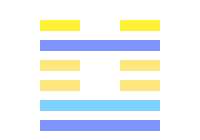
60.1.5.6 (60 > 4) - THE KIEH HEXAGRAM.
- 1. The first line, undivided, shows its subject not quitting the courtyard outside his door. There will be no error.
- 5. The fifth line, undivided, shows its subject sweetly and acceptably enacting his regulations. There will be good fortune. The onward progress with them will afford ground for admiration.
- 6. The topmost line, divided, shows its subject enacting regulations severe and difficult. Even with firmness and correctness there will be evil. But though there will be cause for repentance, it will (by and by) disappear.
60.1.5.6 (60 > 4) - The limit
One is going to have to defend oneself from those who want to know how one learned.
Bing DeepL Google Yandex60.1.5.6 (60 > 4) - The limit
One is going to have to defend oneself from those who want to know how one learned.
Bing DeepL Google Yandex60.1.5.6 (60 > 4) - Tsieh, la délimitation
Tsieh : règle, loi, mesure.
-
1. Tel ne sort pas de la porte extérieure de son habitation et n’en a point de regret.
(Dès qu’il voit tout ce qui se passe chez lui, il peut tout y bien gouverner.) Quand on sait qu’il y a lieu de ne pas sortir ou bien empêchement. - 5. Appliquer doucement les lois est une condition de prospérité. En procédant ainsi, on se rendra illustre ; [car on remplit alors ses fonctions parfaitement.]
- 6. Les lois dures ont des conséquences très fâcheuses pour la prospérité. Le repentir (causé par leur violation) s’effacera. [Leur force et valeur s’épuiseront.] (Quand le peuple sent que les lois sont cruelles, il les viole sans scrupule ni repentir.)
60.1.5.6 (60 > 4) - La limite
On va devoir se défendre de ceux qui veulent savoir comment on a appris.
Bing DeepL Google Yandex60.1.5.6 (60 > 4) - Korlátozás
- 1. Nem gyötri saját magát tovább miközben várja hogy visszatérjenek a barátai.
- 5. Segítség nélkül felfedez egy új utat hogy megoldja a szükségest, így elismerést kap.
- 6. Nagy nyomás alatt.
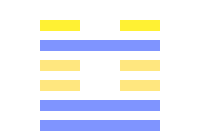
60.1.2.5.6 (60 > 23) - THE KIEH HEXAGRAM.
- 1. The first line, undivided, shows its subject not quitting the courtyard outside his door. There will be no error.
- 2. The second line, undivided, shows its subject not quitting the courtyard inside his gate. There will be evil.
- 5. The fifth line, undivided, shows its subject sweetly and acceptably enacting his regulations. There will be good fortune. The onward progress with them will afford ground for admiration.
- 6. The topmost line, divided, shows its subject enacting regulations severe and difficult. Even with firmness and correctness there will be evil. But though there will be cause for repentance, it will (by and by) disappear.
60.1.2.5.6 (60 > 23) - The limit
One beats around the bush with one's opponents to make them wait.
Bing DeepL Google Yandex60.1.2.5.6 (60 > 23) - The limit
One beats around the bush with one's opponents to make them wait.
Bing DeepL Google Yandex60.1.2.5.6 (60 > 23) - Tsieh, la délimitation
Tsieh : règle, loi, mesure.
-
1. Tel ne sort pas de la porte extérieure de son habitation et n’en a point de regret.
(Dès qu’il voit tout ce qui se passe chez lui, il peut tout y bien gouverner.) Quand on sait qu’il y a lieu de ne pas sortir ou bien empêchement. -
2. Mais s’il ne passe pas la porte intérieure de la maison (celle du quartier intérieur, du quartier des femmes), il éprouvera les mauvais effets de cette conduite. (Ne voyant que partiellement ce qui se passe chez lui, il pourra lui arriver des désagréments.)
Il manquera le point de temps extrême pour faire le nécessaire selon les circonstances. - 5. Appliquer doucement les lois est une condition de prospérité. En procédant ainsi, on se rendra illustre ; [car on remplit alors ses fonctions parfaitement.]
- 6. Les lois dures ont des conséquences très fâcheuses pour la prospérité. Le repentir (causé par leur violation) s’effacera. [Leur force et valeur s’épuiseront.] (Quand le peuple sent que les lois sont cruelles, il les viole sans scrupule ni repentir.)
60.1.2.5.6 (60 > 23) - La limite
On finasse avec ses adversaires pour les faire patienter.
Bing DeepL Google Yandex60.1.2.5.6 (60 > 23) - Korlátozás
- 1. Nem gyötri saját magát tovább miközben várja hogy visszatérjenek a barátai.
- 2. Elrejti a bizonytalanságokat hogy uralja a helyzetet.
- 5. Segítség nélkül felfedez egy új utat hogy megoldja a szükségest, így elismerést kap.
- 6. Nagy nyomás alatt.
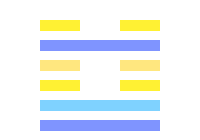
60.1.3.5.6 (60 > 18) - THE KIEH HEXAGRAM.
- 1. The first line, undivided, shows its subject not quitting the courtyard outside his door. There will be no error.
- 3. The third line, divided, shows its subject with no appearance of observing the (proper) regulations, in which case we shall see him lamenting. But there will be no one to blame (but himself).
- 5. The fifth line, undivided, shows its subject sweetly and acceptably enacting his regulations. There will be good fortune. The onward progress with them will afford ground for admiration.
- 6. The topmost line, divided, shows its subject enacting regulations severe and difficult. Even with firmness and correctness there will be evil. But though there will be cause for repentance, it will (by and by) disappear.
60.1.3.5.6 (60 > 18) - The limit
One resolves a dilemma by going to the side that seems most promising.
Bing DeepL Google Yandex60.1.3.5.6 (60 > 18) - The limit
One resolves a dilemma by going to the side that seems most promising.
Bing DeepL Google Yandex60.1.3.5.6 (60 > 18) - Tsieh, la délimitation
Tsieh : règle, loi, mesure.
-
1. Tel ne sort pas de la porte extérieure de son habitation et n’en a point de regret.
(Dès qu’il voit tout ce qui se passe chez lui, il peut tout y bien gouverner.) Quand on sait qu’il y a lieu de ne pas sortir ou bien empêchement. - 3. Qui n’observe pas les lois s’en repentira suffisamment par la suite et se lamentera sans que personne ait besoin de le blâmer. (Ou bien : s’en repentira si amèrement que personne n’aura le courage de le blâmer.)
- 5. Appliquer doucement les lois est une condition de prospérité. En procédant ainsi, on se rendra illustre ; [car on remplit alors ses fonctions parfaitement.]
- 6. Les lois dures ont des conséquences très fâcheuses pour la prospérité. Le repentir (causé par leur violation) s’effacera. [Leur force et valeur s’épuiseront.] (Quand le peuple sent que les lois sont cruelles, il les viole sans scrupule ni repentir.)
60.1.3.5.6 (60 > 18) - La limite
On tranche un dilemme en allant du côté qui semble le plus prometteur.
Bing DeepL Google Yandex60.1.3.5.6 (60 > 18) - Korlátozás
- 1. Nem gyötri saját magát tovább miközben várja hogy visszatérjenek a barátai.
- 3. Túl gyenge hogy táplálja a csoportját így felkészül hogy felszámolja a függőségüket.
- 5. Segítség nélkül felfedez egy új utat hogy megoldja a szükségest, így elismerést kap.
- 6. Nagy nyomás alatt.
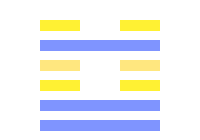
60.1.2.3.5.6 (60 > 52) - THE KIEH HEXAGRAM.
- 1. The first line, undivided, shows its subject not quitting the courtyard outside his door. There will be no error.
- 2. The second line, undivided, shows its subject not quitting the courtyard inside his gate. There will be evil.
- 3. The third line, divided, shows its subject with no appearance of observing the (proper) regulations, in which case we shall see him lamenting. But there will be no one to blame (but himself).
- 5. The fifth line, undivided, shows its subject sweetly and acceptably enacting his regulations. There will be good fortune. The onward progress with them will afford ground for admiration.
- 6. The topmost line, divided, shows its subject enacting regulations severe and difficult. Even with firmness and correctness there will be evil. But though there will be cause for repentance, it will (by and by) disappear.
60.1.2.3.5.6 (60 > 52) - The limit
One executes the orders as they were given.
Bing DeepL Google Yandex60.1.2.3.5.6 (60 > 52) - The limit
One executes the orders as they were given.
Bing DeepL Google Yandex60.1.2.3.5.6 (60 > 52) - Tsieh, la délimitation
Tsieh : règle, loi, mesure.
-
1. Tel ne sort pas de la porte extérieure de son habitation et n’en a point de regret.
(Dès qu’il voit tout ce qui se passe chez lui, il peut tout y bien gouverner.) Quand on sait qu’il y a lieu de ne pas sortir ou bien empêchement. -
2. Mais s’il ne passe pas la porte intérieure de la maison (celle du quartier intérieur, du quartier des femmes), il éprouvera les mauvais effets de cette conduite. (Ne voyant que partiellement ce qui se passe chez lui, il pourra lui arriver des désagréments.)
Il manquera le point de temps extrême pour faire le nécessaire selon les circonstances. - 3. Qui n’observe pas les lois s’en repentira suffisamment par la suite et se lamentera sans que personne ait besoin de le blâmer. (Ou bien : s’en repentira si amèrement que personne n’aura le courage de le blâmer.)
- 5. Appliquer doucement les lois est une condition de prospérité. En procédant ainsi, on se rendra illustre ; [car on remplit alors ses fonctions parfaitement.]
- 6. Les lois dures ont des conséquences très fâcheuses pour la prospérité. Le repentir (causé par leur violation) s’effacera. [Leur force et valeur s’épuiseront.] (Quand le peuple sent que les lois sont cruelles, il les viole sans scrupule ni repentir.)
60.1.2.3.5.6 (60 > 52) - La limite
On exécute les ordres tels qu'ils ont été communiqués.
Bing DeepL Google Yandex60.1.2.3.5.6 (60 > 52) - Korlátozás
- 1. Nem gyötri saját magát tovább miközben várja hogy visszatérjenek a barátai.
- 2. Elrejti a bizonytalanságokat hogy uralja a helyzetet.
- 3. Túl gyenge hogy táplálja a csoportját így felkészül hogy felszámolja a függőségüket.
- 5. Segítség nélkül felfedez egy új utat hogy megoldja a szükségest, így elismerést kap.
- 6. Nagy nyomás alatt.
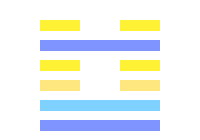
60.1.4.5.6 (60 > 64) - THE KIEH HEXAGRAM.
- 1. The first line, undivided, shows its subject not quitting the courtyard outside his door. There will be no error.
- 4. The fourth line, divided, shows its subject quietly and naturally (attentive to all) regulations. There will be progress and success.
- 5. The fifth line, undivided, shows its subject sweetly and acceptably enacting his regulations. There will be good fortune. The onward progress with them will afford ground for admiration.
- 6. The topmost line, divided, shows its subject enacting regulations severe and difficult. Even with firmness and correctness there will be evil. But though there will be cause for repentance, it will (by and by) disappear.
60.1.4.5.6 (60 > 64) - The limit
One whines all the time whereas others do their best.
Bing DeepL Google Yandex60.1.4.5.6 (60 > 64) - The limit
One whines all the time whereas others do their best.
Bing DeepL Google Yandex60.1.4.5.6 (60 > 64) - Tsieh, la délimitation
Tsieh : règle, loi, mesure.
-
1. Tel ne sort pas de la porte extérieure de son habitation et n’en a point de regret.
(Dès qu’il voit tout ce qui se passe chez lui, il peut tout y bien gouverner.) Quand on sait qu’il y a lieu de ne pas sortir ou bien empêchement. - 4. Les lois observées pacifiquement donnent la prospérité [et perpétuent le règne de la justice.]
- 5. Appliquer doucement les lois est une condition de prospérité. En procédant ainsi, on se rendra illustre ; [car on remplit alors ses fonctions parfaitement.]
- 6. Les lois dures ont des conséquences très fâcheuses pour la prospérité. Le repentir (causé par leur violation) s’effacera. [Leur force et valeur s’épuiseront.] (Quand le peuple sent que les lois sont cruelles, il les viole sans scrupule ni repentir.)
60.1.4.5.6 (60 > 64) - La limite
On se plaint sans cesse alors que les autres font de leur mieux.
Bing DeepL Google Yandex60.1.4.5.6 (60 > 64) - Korlátozás
- 1. Nem gyötri saját magát tovább miközben várja hogy visszatérjenek a barátai.
- 4. Vonakodik hogy kérje másoktól hogy elfogadják a fáradtságot, így befejezi az előkészítést a legalkalmasabbal.
- 5. Segítség nélkül felfedez egy új utat hogy megoldja a szükségest, így elismerést kap.
- 6. Nagy nyomás alatt.
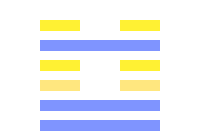
60.1.2.4.5.6 (60 > 35) - THE KIEH HEXAGRAM.
- 1. The first line, undivided, shows its subject not quitting the courtyard outside his door. There will be no error.
- 2. The second line, undivided, shows its subject not quitting the courtyard inside his gate. There will be evil.
- 4. The fourth line, divided, shows its subject quietly and naturally (attentive to all) regulations. There will be progress and success.
- 5. The fifth line, undivided, shows its subject sweetly and acceptably enacting his regulations. There will be good fortune. The onward progress with them will afford ground for admiration.
- 6. The topmost line, divided, shows its subject enacting regulations severe and difficult. Even with firmness and correctness there will be evil. But though there will be cause for repentance, it will (by and by) disappear.
60.1.2.4.5.6 (60 > 35) - The limit
One listens again tirelessly to resounding speeches.
Bing DeepL Google Yandex60.1.2.4.5.6 (60 > 35) - The limit
One listens again tirelessly to resounding speeches.
Bing DeepL Google Yandex60.1.2.4.5.6 (60 > 35) - Tsieh, la délimitation
Tsieh : règle, loi, mesure.
-
1. Tel ne sort pas de la porte extérieure de son habitation et n’en a point de regret.
(Dès qu’il voit tout ce qui se passe chez lui, il peut tout y bien gouverner.) Quand on sait qu’il y a lieu de ne pas sortir ou bien empêchement. -
2. Mais s’il ne passe pas la porte intérieure de la maison (celle du quartier intérieur, du quartier des femmes), il éprouvera les mauvais effets de cette conduite. (Ne voyant que partiellement ce qui se passe chez lui, il pourra lui arriver des désagréments.)
Il manquera le point de temps extrême pour faire le nécessaire selon les circonstances. - 4. Les lois observées pacifiquement donnent la prospérité [et perpétuent le règne de la justice.]
- 5. Appliquer doucement les lois est une condition de prospérité. En procédant ainsi, on se rendra illustre ; [car on remplit alors ses fonctions parfaitement.]
- 6. Les lois dures ont des conséquences très fâcheuses pour la prospérité. Le repentir (causé par leur violation) s’effacera. [Leur force et valeur s’épuiseront.] (Quand le peuple sent que les lois sont cruelles, il les viole sans scrupule ni repentir.)
60.1.2.4.5.6 (60 > 35) - La limite
On réécoute sans se lasser des discours retentissants.
Bing DeepL Google Yandex60.1.2.4.5.6 (60 > 35) - Korlátozás
- 1. Nem gyötri saját magát tovább miközben várja hogy visszatérjenek a barátai.
- 2. Elrejti a bizonytalanságokat hogy uralja a helyzetet.
- 4. Vonakodik hogy kérje másoktól hogy elfogadják a fáradtságot, így befejezi az előkészítést a legalkalmasabbal.
- 5. Segítség nélkül felfedez egy új utat hogy megoldja a szükségest, így elismerést kap.
- 6. Nagy nyomás alatt.
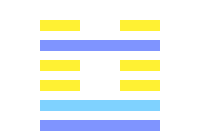
60.1.3.4.5.6 (60 > 50) - THE KIEH HEXAGRAM.
- 1. The first line, undivided, shows its subject not quitting the courtyard outside his door. There will be no error.
- 3. The third line, divided, shows its subject with no appearance of observing the (proper) regulations, in which case we shall see him lamenting. But there will be no one to blame (but himself).
- 4. The fourth line, divided, shows its subject quietly and naturally (attentive to all) regulations. There will be progress and success.
- 5. The fifth line, undivided, shows its subject sweetly and acceptably enacting his regulations. There will be good fortune. The onward progress with them will afford ground for admiration.
- 6. The topmost line, divided, shows its subject enacting regulations severe and difficult. Even with firmness and correctness there will be evil. But though there will be cause for repentance, it will (by and by) disappear.
60.1.3.4.5.6 (60 > 50) - The limit
One has slowed down the development of one's company so as not having too many expenses to manage.
Bing DeepL Google Yandex60.1.3.4.5.6 (60 > 50) - The limit
One has slowed down the development of one's company so as not having too many expenses to manage.
Bing DeepL Google Yandex60.1.3.4.5.6 (60 > 50) - Tsieh, la délimitation
Tsieh : règle, loi, mesure.
-
1. Tel ne sort pas de la porte extérieure de son habitation et n’en a point de regret.
(Dès qu’il voit tout ce qui se passe chez lui, il peut tout y bien gouverner.) Quand on sait qu’il y a lieu de ne pas sortir ou bien empêchement. - 3. Qui n’observe pas les lois s’en repentira suffisamment par la suite et se lamentera sans que personne ait besoin de le blâmer. (Ou bien : s’en repentira si amèrement que personne n’aura le courage de le blâmer.)
- 4. Les lois observées pacifiquement donnent la prospérité [et perpétuent le règne de la justice.]
- 5. Appliquer doucement les lois est une condition de prospérité. En procédant ainsi, on se rendra illustre ; [car on remplit alors ses fonctions parfaitement.]
- 6. Les lois dures ont des conséquences très fâcheuses pour la prospérité. Le repentir (causé par leur violation) s’effacera. [Leur force et valeur s’épuiseront.] (Quand le peuple sent que les lois sont cruelles, il les viole sans scrupule ni repentir.)
60.1.3.4.5.6 (60 > 50) - La limite
On a freiné le développement de son entreprise pour ne pas avoir trop de charges à gérer.
Bing DeepL Google Yandex60.1.3.4.5.6 (60 > 50) - Korlátozás
- 1. Nem gyötri saját magát tovább miközben várja hogy visszatérjenek a barátai.
- 3. Túl gyenge hogy táplálja a csoportját így felkészül hogy felszámolja a függőségüket.
- 4. Vonakodik hogy kérje másoktól hogy elfogadják a fáradtságot, így befejezi az előkészítést a legalkalmasabbal.
- 5. Segítség nélkül felfedez egy új utat hogy megoldja a szükségest, így elismerést kap.
- 6. Nagy nyomás alatt.
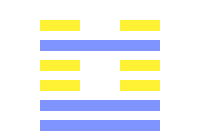
60.1.2.3.4.5.6 (60 > 56) - THE KIEH HEXAGRAM.
- 1. The first line, undivided, shows its subject not quitting the courtyard outside his door. There will be no error.
- 2. The second line, undivided, shows its subject not quitting the courtyard inside his gate. There will be evil.
- 3. The third line, divided, shows its subject with no appearance of observing the (proper) regulations, in which case we shall see him lamenting. But there will be no one to blame (but himself).
- 4. The fourth line, divided, shows its subject quietly and naturally (attentive to all) regulations. There will be progress and success.
- 5. The fifth line, undivided, shows its subject sweetly and acceptably enacting his regulations. There will be good fortune. The onward progress with them will afford ground for admiration.
- 6. The topmost line, divided, shows its subject enacting regulations severe and difficult. Even with firmness and correctness there will be evil. But though there will be cause for repentance, it will (by and by) disappear.
60.1.2.3.4.5.6 (60 > 56) - The limit
One expects from one' s superiors that they will not make any more blunders.
Bing DeepL Google Yandex60.1.2.3.4.5.6 (60 > 56) - The limit
One expects from one' s superiors that they will not make any more blunders.
Bing DeepL Google Yandex60.1.2.3.4.5.6 (60 > 56) - Tsieh, la délimitation
Tsieh : règle, loi, mesure.
-
1. Tel ne sort pas de la porte extérieure de son habitation et n’en a point de regret.
(Dès qu’il voit tout ce qui se passe chez lui, il peut tout y bien gouverner.) Quand on sait qu’il y a lieu de ne pas sortir ou bien empêchement. -
2. Mais s’il ne passe pas la porte intérieure de la maison (celle du quartier intérieur, du quartier des femmes), il éprouvera les mauvais effets de cette conduite. (Ne voyant que partiellement ce qui se passe chez lui, il pourra lui arriver des désagréments.)
Il manquera le point de temps extrême pour faire le nécessaire selon les circonstances. - 3. Qui n’observe pas les lois s’en repentira suffisamment par la suite et se lamentera sans que personne ait besoin de le blâmer. (Ou bien : s’en repentira si amèrement que personne n’aura le courage de le blâmer.)
- 4. Les lois observées pacifiquement donnent la prospérité [et perpétuent le règne de la justice.]
- 5. Appliquer doucement les lois est une condition de prospérité. En procédant ainsi, on se rendra illustre ; [car on remplit alors ses fonctions parfaitement.]
- 6. Les lois dures ont des conséquences très fâcheuses pour la prospérité. Le repentir (causé par leur violation) s’effacera. [Leur force et valeur s’épuiseront.] (Quand le peuple sent que les lois sont cruelles, il les viole sans scrupule ni repentir.)
60.1.2.3.4.5.6 (60 > 56) - La limite
On attend de ses supérieurs qu'ils ne fassent plus de bévues.
Bing DeepL Google Yandex60.1.2.3.4.5.6 (60 > 56) - Korlátozás
- 1. Nem gyötri saját magát tovább miközben várja hogy visszatérjenek a barátai.
- 2. Elrejti a bizonytalanságokat hogy uralja a helyzetet.
- 3. Túl gyenge hogy táplálja a csoportját így felkészül hogy felszámolja a függőségüket.
- 4. Vonakodik hogy kérje másoktól hogy elfogadják a fáradtságot, így befejezi az előkészítést a legalkalmasabbal.
- 5. Segítség nélkül felfedez egy új utat hogy megoldja a szükségest, így elismerést kap.
- 6. Nagy nyomás alatt.

